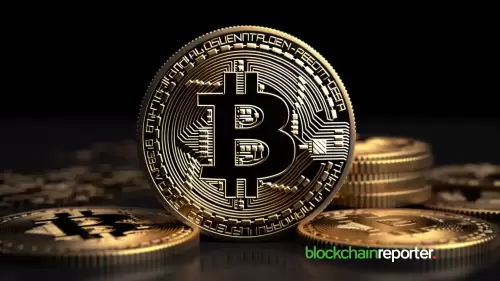 |
|
 |
|
 |
|
 |
|
 |
|
 |
|
 |
|
 |
|
 |
|
 |
|
 |
|
 |
|
 |
|
 |
|
 |
|
加密貨幣新聞文章
Bitcoin Will Become the World's Reserve Asset 'Much Sooner Than People Think'
2025/05/09 11:00

David Bailey, chief executive of Bitcoin Inc. and confidant of US President Trump, mapped out a trajectory that he believes will carry the world’s first cryptocurrency from insurgent technology to primary reserve asset “much sooner than people think.”
Speaking on The Scoop with host Frank Chaparro, Bailey described a confluence of political opportunism, sovereign-scale mining, and balance-sheet securitisation that, in his view, is steadily eroding the old monetary order.
Bailey did not mince words about the scale of the transition. “We are on a path for Bitcoin becoming the reserve asset of the world,” he said, adding that the timetable is accelerating. The claim framed a discussion that ranged from Trump’s newly discovered “Bitcoin president” persona to Bhutan’s dependence on block-subsidy revenue and SoftBank’s entrance into the treasury-stock arbitrage game.
Trump's Bitcoin Pivot
Bailey recounted his first meeting with Trump at Trump Tower, where he and others attempted to fold Bitcoin into the president’s platform. The encounter, he said, revealed an instinctive political antenna. Trump “has this ability to sort of flip his persona […] from joking and having a good time […] to business Trump, decision time.”
What began as a meme-driven overture has, in Bailey’s telling, evolved into a reflexive campaign plank. The candidates for president in 2024 are “all over the crypto issues now because they're a big voting bloc. It's heating up on the campaign trail because of the constituency.”
That pivot matters, Bailey argued, because the constituency is already electorally significant. “Crypto Americans […] are 90 million people, 80 million people,” he told Chaparro. Trump, he added, believes the cohort is “more fervent and there’s more of us than gun owners.” The implication is that Bitcoin’s ideological freight—“the politics of not wanting politics,” as Bailey put it—has begun to acquire conventional muscle at the ballot box.
If politics provides the narrative, energy provides the cash flow. Bailey said sovereign mining has crossed an inflection point, estimating that “about 50 countries” now run public-private mining ventures drawing on excess generating capacity. Scale, he suggested, is no longer trivial: qualifying nations are “using like 100-plus megawatts of power,” with some “using gigawatts.”
The Himalayan kingdom of Bhutan is Bailey’s canonical example. Bitcoin mining there now accounts for “50% of the GDP of the country […] it might even be higher.” Such dependence, he argued, turns hash-rate exports into a pillar of fiscal solvency, but it also up-ends competition for commercial miners. Competing with a sovereign that “has no cost basis for its energy” compresses margins for everyone else.
Sovereign Energy Drives Bitcoin Mining
Sovereign accumulation naturally follows sovereign production, Bailey contended. Once a government controls block rewards, the internal question shifts to custody, sale-versus-retention, and institutional mandate.
While only El Salvador and the Central African Republic have publicly adopted Bitcoin as legal tender or reserve asset, Bailey asserted that “sovereign money is flowing into [the] Bitcoin market already in pretty significant size,” some of it routed through sovereign-wealth funds rather than central banks.
He linked that flow to an emergent national-security framing. “Is it a national-security issue for your country not to have [… ] the dominant reserve asset? Yeah, definitely.” Defence establishments, he hinted, have begun weighing whether Bitcoin strengthens or undercuts existing security doctrines, a debate he expects to surface in US congressional testimony later this year.
The Strategy Template
At the corporate level, Michael Saylor’s Strategy remains the reference model.
Bailey said Saylor’s playbook—issuing equity or debt, buying Bitcoin, letting market-capitalisation premia offset dilution—has already been copied “widely all over the place.” By his count, “we’re probably pushing 200” listed companies running variations of the strategy; he projects “many hundreds” by year-end. The supply-demand consequences are, in Bailey’s view, transparent: “There’s just not enough Bitcoin marginally to be satisfied at this price. The price is going to have to go way up.”
The mechanism is not without systemic risk. Bailey likened the corporate-Bitcoin trade to the closed-end trust structure that once governed GBTC, while emphasising a crucial distinction: operating companies can repurchase their own shares if they slip to a discount. Even so, he warned that widespread share-collateral lending could propagate leverage across equity markets, making a severe Bitcoin drawdown a potential trigger for global deleveraging.
“A bear market in Bitcoin could cause financial contagion […] and there’s really nothing anyone can do to stop it.”
Throughout the interview Bailey returned to institutional fragility. “These institutions are way weaker and way more
免責聲明:info@kdj.com
所提供的資訊並非交易建議。 kDJ.com對任何基於本文提供的資訊進行的投資不承擔任何責任。加密貨幣波動性較大,建議您充分研究後謹慎投資!
如果您認為本網站使用的內容侵犯了您的版權,請立即聯絡我們(info@kdj.com),我們將及時刪除。
-

- 比特幣流動性,滲透區和投資者的興趣:深入潛水
- 2025-08-03 14:00:00
- 在市場測試中,探索滲透區域中比特幣流動性的激增,並在市場測試中強烈的投資者信心。
-

- Web3,體育和計算能力:新的舞會
- 2025-08-03 13:59:21
- 探索Web3,計算能力和Boostara等創新平台如何徹底改變體育行業,為運動員和球迷創造新的機會。
-

-

- 加密鯨魚,模因硬幣和月光鏡頭:在2025年野外航行
- 2025-08-03 13:45:34
- 探索2025年加密鯨,模因硬幣和月球批發的融合。在這種動態景觀中發現趨勢,見解和潛在機會。
-

- 香港Stablecoin許可證:緊緊擠壓?
- 2025-08-03 13:24:03
- 香港對Stablecoin監管的方法是嚴格的,這表明數字資產創新與金融穩定之間的平衡謹慎。這對未來意味著什麼?
-

-

- XRP,FLR和突破潛力:嗡嗡聲是什麼?
- 2025-08-03 13:17:29
- 深入研究XRP的掙扎,FLR的潛力以及突破是否即將到來。獲取最新的見解和分析。
-

-






























































